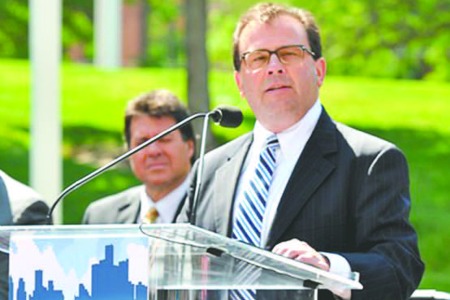
These are, in many ways, tough times in the city of Detroit. There can be no doubt about that.
But as I see it, some very important blocks are being put into place to rebuild this great city, where I was born and raised, and where today I run a business employing more than 6,400 people working downtown.
Unlike other unsuccessful revitalization pushes of the past, this one has support from a broad array of interests and has the look of being sustainable.
Scarcely a week goes by nowadays when a major national or international news outlet doesn’t devote a story to Detroit’s emerging entrepreneurial scene, or discuss how demand for housing in some neighborhoods is outpacing supply. A travel writer recently asserted that Detroit is a better place to visit than Chicago, with friendlier residents and stunning architecture. NBC recently featured the Downtown Boxing Gym, an east-side nonprofit offering local kids an alternative to the streets.
The central business district is a vastly different place than it was just a few years ago, filled with vitality and new energy. Walking around Campus Martius at lunch these days, you could easily mistake yourself for being in Manhattan. In fact, Forbes recently included Detroit in a list of “10 Up and Coming Downtowns” (the list also included Grand Rapids). Great things are in store, with companies like Campbell Ewald set to move downtown and Red Piston, a mobile app developer based across the border in Windsor, having opened a sales office here.
Buildings like the Broderick Tower and the David Whitney Building that were long empty are being redeveloped. In Midtown, new mixed-use developments like the Auburn and the Woodward Garden Block Development are adding density and new vitality. Construction is set to begin this year on the M-1 Rail project, backed by my company and a number of Detroit-based businesses and employers.
Business leaders are showing their faith in Detroit, and Blue Cross is proud to join them in pitching in to make the city a better place. As U.S. Transportation Secretary Ray LaHood put it when announcing the federal government’s backing of M-1 Rail, “No other city in America has had their business community come together and raise $100 million dollars.”
Community discussions about how the downtown and Midtown cores are prospering while city neighborhoods continue to struggle are understandable. But there are very real indicators that businesses, nonprofits and community groups are rallying to do what they can, given limited financial resources, to make things better.
In March, BCBSM joined Chrysler, Ford, GM, Quicken Loans, The Kresge Foundation, Penske Corp., Platinum Equity and FirstMerit Bank to contribute $8 million to Mayor Dave Bing’s Active and Safe Campaign. The money will be used to replace the city’s fleet of 23 ambulances and purchase 100 new police cruisers, addressing a key concern about public safety.
You also see innovative work being done by community groups like Southwest Solutions, the Brightmoor Alliance, People for Palmer Park and the Grandmont Rosedale Development Corp. to overcome the forces of decline and improve their home neighborhoods. On Oakman Boulevard, for example, the Neighborhood Service Organization is spending $50 million to redevelop the former Michigan Bell Building as housing for homeless people, complete with a health clinic, financial literacy classes and other services.
Businesses that invest downtown are creating jobs and adding tax revenue that benefit the entire city. Nonprofit groups and volunteers are doing what they can to stabilize neighborhoods. When housing becomes scarce in Corktown or Midtown, people start looking further out, and a new cycle begins.
In Detroit, we’re all part of the city’s future, and every little bit of progress makes it a little easier for the city to tackle serious longstanding issues and move forward.
Daniel J. Loepp is president and chief executive officer of Blue Cross Blue Shield of Michigan and chairman of the Executive Committee of the Downtown Detroit Partnership.
